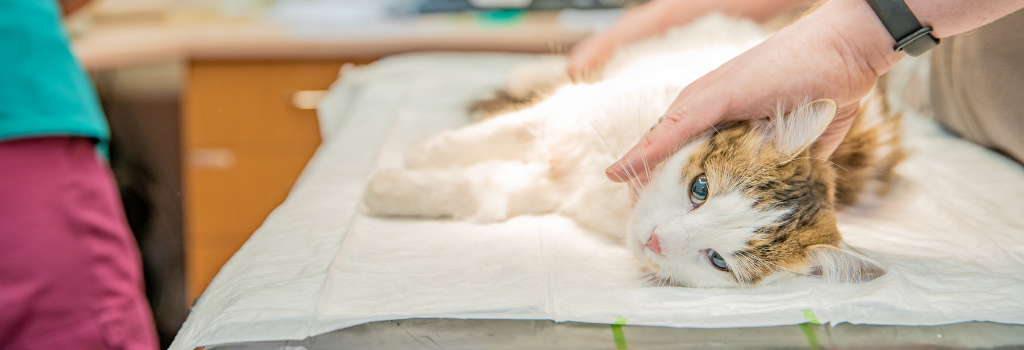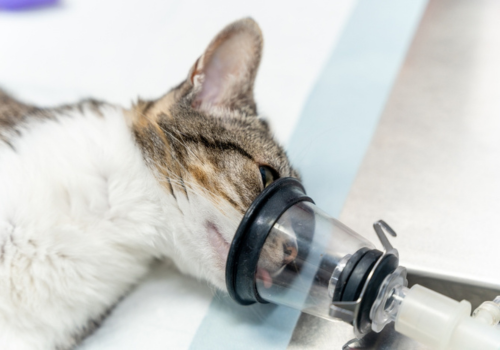When your cat isn’t feeling well, sometimes it takes several tests before your veterinarian can come to a conclusive diagnosis. Depending on your cat’s symptoms, an endoscopy might be necessary, which is a minimally-invasive diagnostic procedure performed right in your veterinarian’s office. Your cat will be comfortably resting at home that same day, and you’ll likely have a diagnosis since endoscopy provides a real-time look inside your cat’s body. At Southwest Virginia Veterinary Services, we work extremely hard to bring you factual information you can trust. We’ve taken the most frequently asked questions about cat endoscopy and answered them as thoroughly and accurately as possible to ensure you have the facts.
If you’re looking for a highly trained veterinarian in Lebanon, VA, we’d love to see your cat if they’re exhibiting symptoms of illness, so please call us at (276) 265-8183.
What is endoscopy?
Endoscopy is a diagnostic procedure used to examine a cat’s internal organs, from its ears to its gastrointestinal tract. It involves using an endoscope, a medical instrument with a camera. A rigid endoscope examines smaller organs, such as the nose and throat, while a flexible endoscope examines larger organs, such as the bladder. Certain endoscopes can also be fitted with forceps to retrieve tissue for further examination.
Many cat owners associate endoscopy with gastrointestinal issues. However, it helps diagnose a number of different diseases.

Endoscopy is used to examine the following internally:
- Nose
- Ears
- Mouth
- Pharynx & larynx
- Trachea
- Gastrointestinal tract
- Rectum
- Urethra (female cats only)
- Bladder (female cats only)
What types of disease is my veterinarian looking for with endoscopy?
If your veterinarian has requested an endoscopy of your cat, it’s likely because your cat has presented with symptoms such as weight loss, vomiting, or diarrhea, and there is little understanding of what is causing those symptoms. The first order of business might be to order blood work, but if those results are normal, your veterinarian needs to perform further tests to diagnose your cat.
The next step might be an x-ray or ultrasound to look at vital organs such as the liver, kidneys, spleen, stomach, and intestines. However, some diseases, such as gastrointestinal disease, can appear normal on an X-ray and ultrasound. If there is still no conclusive diagnosis, an endoscopy is the next test a veterinarian would perform to take a closer look and also to collect tissue for biopsy. Specific cat conditions that can be discovered with endoscopy include inflammatory bowel disease and cancer, such as gastrointestinal lymphoma.
What happens during a cat endoscopy?
An endoscopy varies depending on the area of your cat being examined, but the process generally begins with local or general anesthesia being administered. The endoscope is inserted into the proper orifice depending on the cat’s symptoms. As the endoscopy is taking place, the veterinarian will have a real-time visual of your cat’s internal organs as the endoscope is being maneuvered. Depending on what is seen, the veterinarian may choose to extract tissue samples for biopsy.

How can I prepare my cat for endoscopy?
Preparation for your cat’s endoscopy is simple but does require a couple of steps. First, since local or general anesthesia will be administered, your cat should receive a thorough examination from your veterinarian before the procedure to ensure they are in good health. Second, your cat must fast before the endoscopy, as it’s important that your cat is void of any stomach and bowel contents. This should be discussed with your veterinarian, so you understand how long your cat should fast and what is allowed during that timeframe, such as water.
What should I expect in terms of recovery after the procedure?
Cats are typically allowed to go home the same day as the endoscopy after recovering from the anesthesia. It very rarely results in an overnight stay unless your cat is suffering from a serious illness that warranted the endoscopy. They will experience very few side effects, if any, since it is a minimally-invasive exploratory diagnostic procedure. Gastrointestinal endoscopy sometimes results in a cat coughing for a few days, which is normal.
How quickly will I know the results of my cat’s endoscopy?
Since your veterinarian will have a real-time visual of the internal organs as the endoscopy is being performed, they should have a good understanding of what is going on with your cat as soon as the procedure is completed. However, a diagnosis might require awaiting biopsy results if tissue samples were extracted.
If you have further questions about cat endoscopy, reach out to your veterinarian. If you live in or near Lebanon, VA, we’d love to see your cat if they are exhibiting any symptoms that might require endoscopy, so please don’t hesitate to call us at (276) 265-8183 or email us at [email protected].

